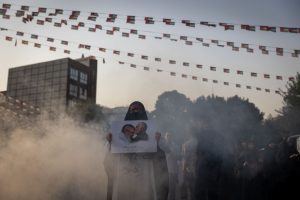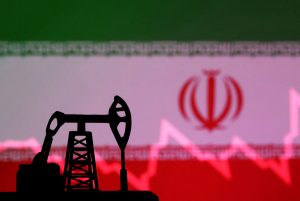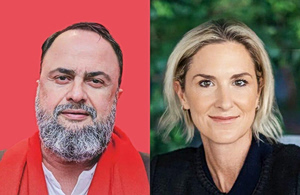A black metallic ore critical to electric vehicles, telecoms and aeronautics is funding a brutal war in the Democratic Republic of Congo—despite U.S. efforts to stop the use of so-called conflict minerals.
Congo is the world’s leading producer of coltan, from which tantalum is extracted. Tantalum is in hot demand because of its growing use in consumer products, from smartphones to laptops.
Coltan is mined in the country’s restive east, a region that has been engulfed in a decadeslong war between rebel groups and the Congolese army. Over the past two years, a powerful militia backed by neighboring Rwanda has taken over swaths of eastern Congo, driving some two million people from their homes as fighters kill, torture and rape civilians. The militia, known as M23, has also seized control of Congo’s coltan production and transport, according to United Nations investigators, supply-chain experts, researchers and local traders.
Now, a network of smuggling routes is increasingly being used to move ore illegally from militia-controlled mines in eastern Congo to neighboring Rwanda. From there, it is sold as Rwandan, and hence “conflict-free,” to smelters around the world, but primarily in China.
M23 fighters levy taxes on informal coltan miners, who dig the ore from the ground, mostly by hand. The fighters also tax the movement of coltan, providing the militia with revenue to purchase weapons and other supplies. Overall, the trade generates around $300,000 a month for the fighters, according to Bintou Keita, the head of the U.N. mission in Congo.
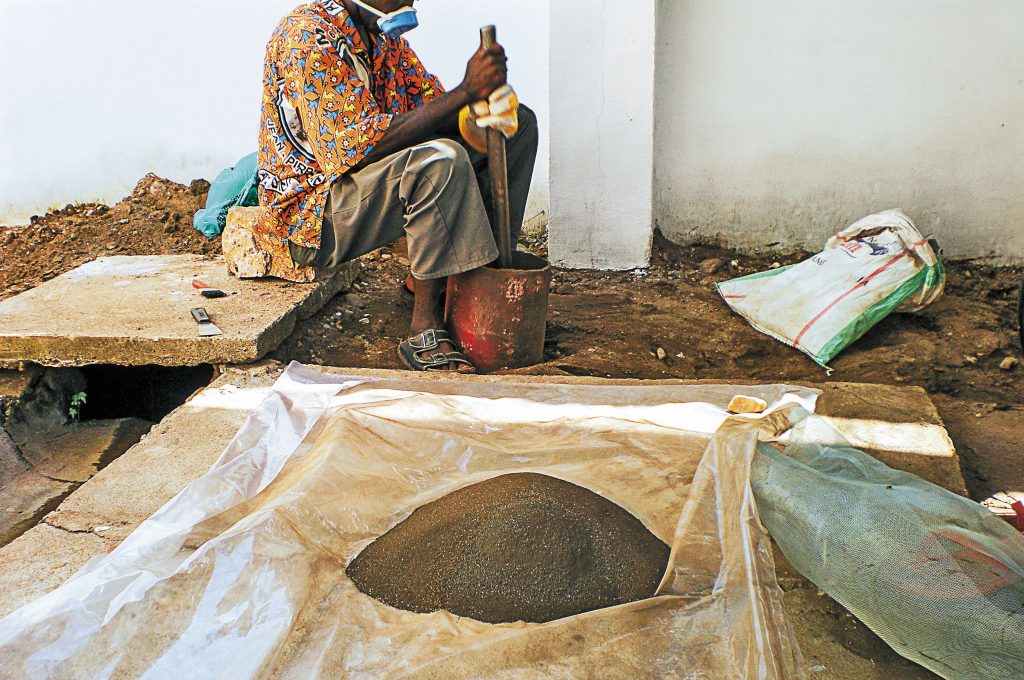
“The criminal laundering of [Congo’s] natural resources smuggled out of the country is strengthening armed groups, sustaining the exploitation of civilian populations, some of them reduced to de facto slavery, and undermining peacemaking efforts,” Keita told the U.N. Security Council last Monday .
The U.S. government considers tantalum a critical mineral and raised concerns about its trade earlier this year. Critical minerals are deemed essential to the U.S. economy or national security, and have supply chains that are vulnerable to disruption.
U.S. lawmakers have sought to prevent minerals commonly mined in eastern Congo—tin, tungsten, tantalum and gold—from financing conflict in the region. Legislation embedded in the 2010 Dodd-Frank Act requires U.S.-listed companies to disclose their use of the minerals, known as the 3TGs, as well as steps they are taking to prevent inadvertently financing armed groups. It doesn’t, however, oblige companies to remove potentially tainted materials from their supply chains.
A recent surge in violence in eastern Congo is coinciding with near-record global demand for tantalum, used in products from Apple iPhones to IBM computers and SpaceX rockets, because it is highly resistant to corrosion and heat.
Tainted minerals
Congo produced about 40% of the world’s coltan in 2023, according to the U.S. Geological Survey, far more than any other country. Regular coltan smuggling through Rwanda makes it difficult for companies that source tantalum from international smelters to ensure that they aren’t financing conflict there.
The Responsible Minerals Initiative, which helps companies avoid metals that fuel or fund violence, alerted buyers to deteriorating conditions in eastern Congo in March, shortly before M23 insurgents took over a region encompassing the coltan-mining town of Rubaya. The organization advised companies to assess the likelihood that they were sourcing coltan from Rubaya and create plans to manage that risk. But coltan from militia-controlled areas such as Rubaya continues to flow into international supply chains, according to researchers.
SpaceX didn’t respond to requests for comment. An IBM spokesman said the company has policies and practices in place to help ensure that the minerals it uses don’t contribute to armed groups in Congo or elsewhere. An Apple spokesman pointed to its latest annual supply-chain report, which says that since 2009, the company has stopped using hundreds of 3TG smelters and refiners that were unable or unwilling to verify compliance with its human rights, governance and other standards.
Smuggled coltan from Congo has helped transform Rwanda into the world’s largest exporter. Rwandan exports surged last year while Congo’s dropped.
That indicates that large and increasing quantities of ore are being smuggled, said Alex Kopp, who has researched coltan’s supply chain for the anticorruption group Global Witness.
“There’s just this mantra, assess the situation, look at the risks, do due diligence and engage with suppliers, and in the end, [companies] keep on sourcing minerals that are likely tainted,” Kopp said. “There can’t be much doubt that these minerals find their way on to the international market.”
Last year, Congo’s finance minister at the time, Nicolas Kazadi, said that the country loses almost $1 billion annually from Congolese minerals that are illegally smuggled into Rwanda.
Yolande Makolo, a spokeswoman for the Rwandan government, said the nation’s mining industry has grown more productive because of increased use of modern techniques and equipment. “This has enabled a mineral recovery rate of between 60% and 70%, up from only 35% of minerals mined using artisanal methods,” she said. Rwanda partners with a widely used traceability and due-diligence program, called the International Tin Supply Chain Initiative, or ITSCI, to ensure that Rwanda’s minerals are “conflict-free,” Makolo added.
Failing initiatives
Other armed groups are also profiting from the illegal coltan trade, including an alliance of militias that is helping the Congolese military fight M23, according to rights groups and U.N. researchers. The alliance, known as the Wazalendo, which U.N. investigators say is armed by Congo’s military, includes groups that are under international sanctions for war crimes.
M23 and the Wazalendo are both recruiting child soldiers , raping women and girls, looting, murdering civilians and committing other atrocities, according to rights groups and U.N. investigators. Like M23, the Wazalendo are collecting illegal taxes on coltan at roadblocks along transportation routes, as well as from some mining sites.
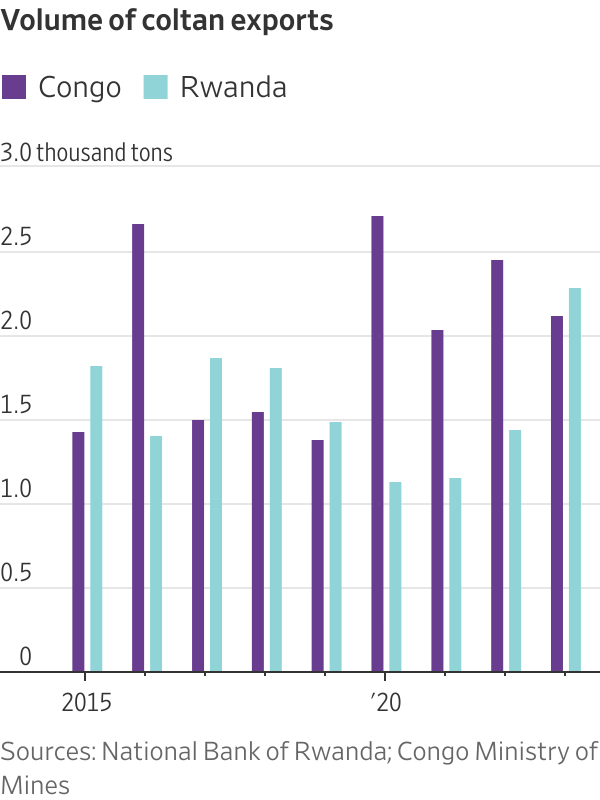
Two Congolese state bodies responsible for regulating informal mining withdrew from Rubaya late last year after M23 cut off the last remaining route to export coltan from Rubaya via the region’s largest city. That prompted ITSCI, which also operates in Congo, to also suspend its operations there.
ITSCI works with several African governments and international smelters to help establish a supply of responsibly-sourced minerals. The program monitors the production and other activities tied to the mining and transport of tin, tungsten and tantalum , and provides government officials with tags and logbooks for tracking the ore from mines to smelters where it is refined.
The U.S. government warned companies in July that traceability initiatives meant to ensure that tantalum and other Congolese minerals are conflict free, are failing.
“Risks associated with human rights and labor rights abuses, corruption, and conflict finance have escalated because of the renewed and ongoing serious conflict,” the U.S. Department of State said.
At the same time, Project Blue, a London-based company that researches the critical-materials market, expects demand for tantalum to grow more than 20% over the next five years because of its use in semiconductors and numerous other consumer products.
“Do we see [tantalum buyers] moving away from it?” said Kyle Pronk, a Project Blue analyst. “Evidently not.”
Write to Alexandra Wexler at alexandra.wexler@wsj.com




